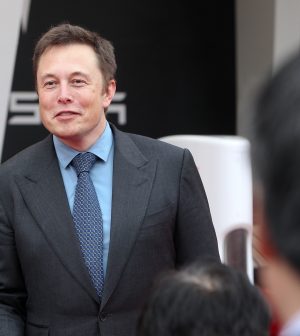- Could Your Grocery Store Meat Be Causing Recurring UTIs?
- Are You Making This Expensive Thermostat Error This Winter?
- Recognizing the Signs of Hypothyroidism
- 10 Strategies to Overcome Insomnia
- Could Artificial Sweeteners Be Aging the Brain Faster?
- Techniques for Soothing Your Nervous System
- Does the Water in Your House Smell Funny? Here’s Why
- Can a Daily Dose of Apple Cider Vinegar Actually Aid Weight Loss?
- 6 Health Beverages That Can Actually Spike Your Blood Sugar
- Treatment Options for Social Anxiety Disorder
Elon Musk’s Neuralink Says Brain-to-Computer Interface Has FDA Approval for Clinical Trial

It may sound like the stuff of science fiction, but Elon Musk’s company Neuralink announced Thursday that the U.S. Food and Drug Administration has approved a human clinical trial of a device that may restore or enhance function when implanted in a human brain.
“We are excited to share that we have received the FDA’s approval to launch our first-in-human clinical study!” the company said in a statement on Twitter Thursday. It’s “an important first step that one day will allow our technology to help many people.”
The device would be surgically implanted into patients’ brains using a robot. The idea is that it would connect with computers to decode brain activity, the Washington Post reported, but the FDA did not announce the trial approval or respond to requests for comment.
This isn’t the only implantable device under study.
Blackrock Neurotech and Synchron have already implanted their devices in people for clinical trials, the Post reported.
There are at least 42 people in the world with brain computer implants, the Post reported, including a quadriplegic patient walking and an ALS patient typing by thinking about keystrokes.
While other companies have been focused on restoring function in people who have lost it because of health diagnoses, Neuralink has tweeted previously, “We want to surpass able-bodied human performance with our technology.”
The concept is that a computer chip with electrodes would be sewed into the brain’s surface by a robot and then regularly updated.
“I’m pretty sure you would not want the iPhone 1 stuck in your head if the iPhone 14 is available,” Musk said at an event in late November.
Neuralink, founded in 2016, has 400 employees and operates out of Fremont, Calif., with a campus under construction in Austin, the Post reported. It has raised at least $363 million, according to data provider PitchBook.
More information
The U.S. Government Accountability Office has more on brain-computer interfaces.
SOURCE: Washington Post
Source: HealthDay
Copyright © 2026 HealthDay. All rights reserved.










